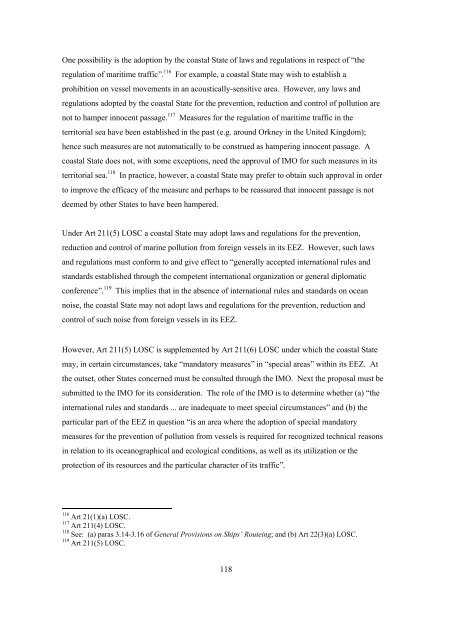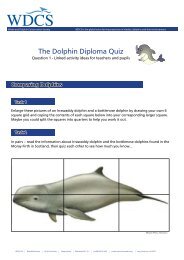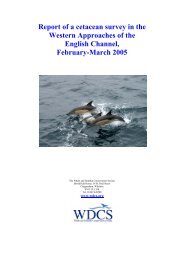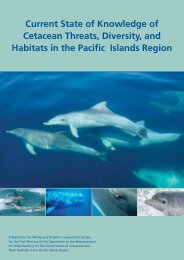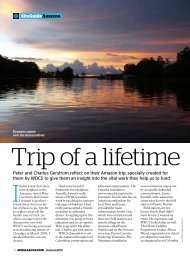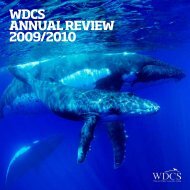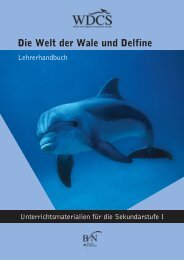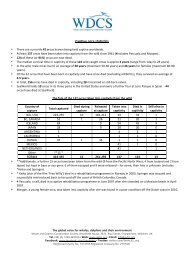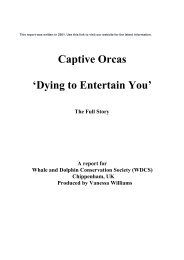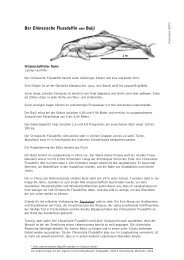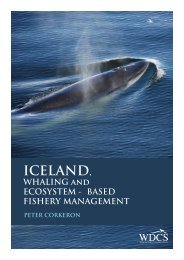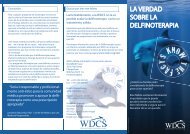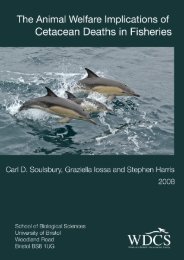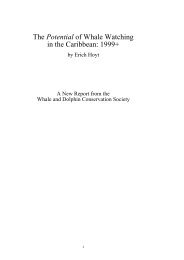Oceans of noise - Whale and Dolphin Conservation Society
Oceans of noise - Whale and Dolphin Conservation Society
Oceans of noise - Whale and Dolphin Conservation Society
Create successful ePaper yourself
Turn your PDF publications into a flip-book with our unique Google optimized e-Paper software.
One possibility is the adoption by the coastal State <strong>of</strong> laws <strong>and</strong> regulations in respect <strong>of</strong> “the<br />
regulation <strong>of</strong> maritime traffic”. 116 For example, a coastal State may wish to establish a<br />
prohibition on vessel movements in an acoustically-sensitive area. However, any laws <strong>and</strong><br />
regulations adopted by the coastal State for the prevention, reduction <strong>and</strong> control <strong>of</strong> pollution are<br />
not to hamper innocent passage. 117 Measures for the regulation <strong>of</strong> maritime traffic in the<br />
territorial sea have been established in the past (e.g. around Orkney in the United Kingdom);<br />
hence such measures are not automatically to be construed as hampering innocent passage. A<br />
coastal State does not, with some exceptions, need the approval <strong>of</strong> IMO for such measures in its<br />
territorial sea. 118 In practice, however, a coastal State may prefer to obtain such approval in order<br />
to improve the efficacy <strong>of</strong> the measure <strong>and</strong> perhaps to be reassured that innocent passage is not<br />
deemed by other States to have been hampered.<br />
Under Art 211(5) LOSC a coastal State may adopt laws <strong>and</strong> regulations for the prevention,<br />
reduction <strong>and</strong> control <strong>of</strong> marine pollution from foreign vessels in its EEZ. However, such laws<br />
<strong>and</strong> regulations must conform to <strong>and</strong> give effect to “generally accepted international rules <strong>and</strong><br />
st<strong>and</strong>ards established through the competent international organization or general diplomatic<br />
conference”. 119 This implies that in the absence <strong>of</strong> international rules <strong>and</strong> st<strong>and</strong>ards on ocean<br />
<strong>noise</strong>, the coastal State may not adopt laws <strong>and</strong> regulations for the prevention, reduction <strong>and</strong><br />
control <strong>of</strong> such <strong>noise</strong> from foreign vessels in its EEZ.<br />
However, Art 211(5) LOSC is supplemented by Art 211(6) LOSC under which the coastal State<br />
may, in certain circumstances, take “m<strong>and</strong>atory measures” in “special areas” within its EEZ. At<br />
the outset, other States concerned must be consulted through the IMO. Next the proposal must be<br />
submitted to the IMO for its consideration. The role <strong>of</strong> the IMO is to determine whether (a) “the<br />
international rules <strong>and</strong> st<strong>and</strong>ards ... are inadequate to meet special circumstances” <strong>and</strong> (b) the<br />
particular part <strong>of</strong> the EEZ in question “is an area where the adoption <strong>of</strong> special m<strong>and</strong>atory<br />
measures for the prevention <strong>of</strong> pollution from vessels is required for recognized technical reasons<br />
in relation to its oceanographical <strong>and</strong> ecological conditions, as well as its utilization or the<br />
protection <strong>of</strong> its resources <strong>and</strong> the particular character <strong>of</strong> its traffic”.<br />
116 Art 21(1)(a) LOSC.<br />
117 Art 211(4) LOSC.<br />
118 See: (a) paras 3.14-3.16 <strong>of</strong> General Provisions on Ships’ Routeing; <strong>and</strong> (b) Art 22(3)(a) LOSC.<br />
119 Art 211(5) LOSC.<br />
118


